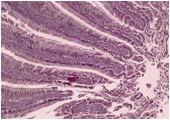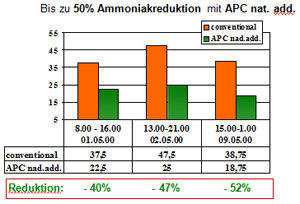APC natural feed additive blends consist of a specific mixture of clay minerals with synergetic effects, herbs, essential oils and a small quantity of trace elements. These ingredients undergo a physical processing and by that we achieve high effects with a small inclusion rate (0.2 %, 2 kg per ton ready feed)!
APC natural feed additive blends result in the animals having an improved and increased surface of the intestinal mucosa and better condition for the microbacteria
This leads to a significantly better feed conversion ratio.
These effects are a focused on a better absorption of proteins and minerals whereby these nutrients can be significantly reduced in the formulas.
A big part of expenses in the animal production results from feed costs. Because of this better absorption with APC natural feed additive blends, significant economie improvement can be made.


 We achieve in the formulas with APC natural feed additives a reduction of acid buffer capacity from 15% to 35% and by this a much healthier intestine!
We achieve in the formulas with APC natural feed additives a reduction of acid buffer capacity from 15% to 35% and by this a much healthier intestine!
